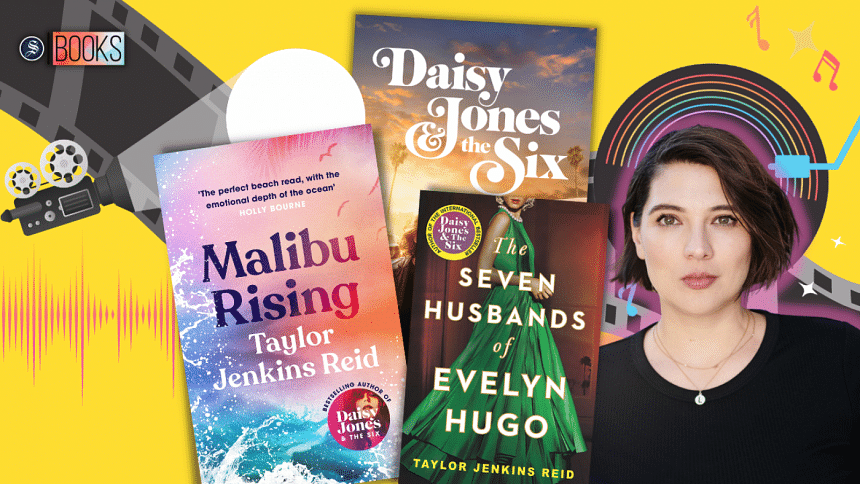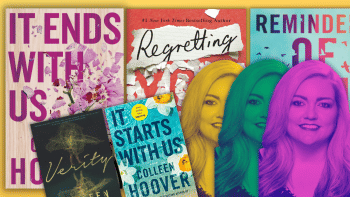The world of Taylor Jenkins Reid—and why we love it

So, this is what you need to know: it is officially Taylor Jenkins Reid's world, and we're just tiny atomic particles living in it. With streaming giants like Netflix, Prime and Hulu scramming to secure rights to adapt her massively successful novels for screen, you need to be living under a rock to not know the influence of TJR's impact on current pop culture.
You could step into any bookstore on the planet and chances are, you will find The Seven Husbands of Evelyn Hugo (2017) stacked quite high on coveted shelves displaying "Greatest Reads of All Time" alongside literary bigwigs like Harper Lee, Kazuo Ishiguro and Khalid Husseini. Although here's the thing, even a swift scan of her books' blurbs will tell you that Reid's stories are nothing like that of her fellow shelf-sharers' work with literary fiction. If anything, "serious readers" (aka literary snobs, aka also me), often condemn her writing for being far too linear and simplistic; her stories dismissed as being excessively soapy and glossy.
On the face of it, these assumptions might not be entirely unfair, because unlike her shelf-neighbours, TJR's books do not dive into war torn lives, dystopian societies, or racism in the heartland. Instead, Reid's protagonists are glamorous movies stars (The Seven Husbands of Evelyn Hugo), millionaire nepo-baby bikini models (Malibu Rising) and traffic-stopping-gorgeous-rail-thin rockstars (Daisy Jones and the Six); basically, people who we definitely are not, and unlikely to be having dinner dates with, in the foreseeable future.
So, what makes Taylor Jenkins Reid this phenomenal, raging success that has the publication world frothing in the mouth and Hollywood throwing the big bucks at her? As an existential and thoroughly experienced lover-hater of Ms Jenkin Reid's work, my editor thought I might be best placed to break it down for you, so here goes:
Thorough Escapism: As a self-proclaimed "sponge of pop-culture", Reid does not pretend to be a server of hard-hitting reality in a shroud of complex literary storytelling. I once saw the author on her Instagram page sporting a slogan tee with the words "Fiction, because real life is terrible".
Her books promise the same, glistening larger than life characters in worlds we can only fantasise about, yet with conflicts that are somehow relatable.
In Carrie Soto is Back (2022), one of my lesser favourites, Reid writes about the universal matter of women's fight against ageing and irrelevance through the lens of competitive sports. Like many of her readers, the thought of flipping through 300 plus pages of tennis terminology did not seem like my idea of a fun time, but the thing about TJR is that she creates a universe so rich and fantastical that once you've dipped your feet in the pond just a little, you're invested for the swim.
World-building: Her dialogue writing remains overwhelmingly dramatic at times. In Carrie Soto Is Back, for example, the protagonist has very little nuance in the delivery of her dialogues and one might mistake it for a retro movie script—and not a very good one at that. But I do feel that Reid has finally found her authentic voice as a writer. No one in the mainstream storytelling business creates a more palpable, deep, and engaging world like Taylor Jenkins Reid. Despite my love-hate relationship with the author's style of writing, I can admit that every single time, I was sucked into the universe she created for her characters to breathe in. The reader is never left behind trying to find their place in the journey; in fact, you become a part of TJR's elaborate world where oscars are won and love songs are performed in rock concerts amidst the setting sun; and you sing along despite not knowing the tune.
Avid readers of Reid will also recognise that the author is cleverly creating a universe where characters from one book will make a quiet appearance in another, giving her world so much more tangibility and texture that one forgets they are amidst fiction.
Character design:
I do not know a single person who has read Daisy Jones and the Six (2019) and not proceeded to Google if they were in fact a real band.
That is true testament to how complete the character arcs are in Reid's novels.
This is particularly marvellous because in almost all her latest outings, Reid deals with a massive ensemble cast. I mean, the title doesn't lie, Evelyn Hugo literally does have seven husbands!
In Daisy Jones and the Six, Reid gives life to not only an entire band, but also the main characters in each of their lives. To give every player their individual journeys which never feel like tangents to the main narrative is reason enough to not dismiss TJR as 'just another pop fiction writer'. It also helps that most of TJR's main leads are unapologetic, flawed, strong women who don't shy away from taking up space in a man's world of the bygone era.
Now that I am done fangirling over Ms Reid's many virtues, I would like to please take a second of your time and let you know that not all is shiny and rosy in the TJR universe. If I were you, I would run at sonic speed from her earlier works such as 2016's One True Loves (what does this title even mean?!) and After I Do (2014). Exceptionally annoying protagonists, poor writing (think using italics to make a strong point) and stories that leave you with very little to ponder over—I would not invite you into this world.
However, with Daisy Jones and the Six making its way to my Prime Video screen tomorrow, I am thoroughly willing to forgive Reid for her past sins. The fact that I never have to listen to another Daisy Jones cover band (yes, they exist) and their version of Aurora and Honeycomb is reason enough for me to get the popcorns poppin' and lights dimmed…it's showtime!
Sarah Ismail Bari is a full time corporate slave, overtime mom, part-time reader and a chronic daydreamer.

 For all latest news, follow The Daily Star's Google News channel.
For all latest news, follow The Daily Star's Google News channel. 









Comments